Orale!! Check out these killer essays!
We're living through history's most ambitious self-deception experiment. While Silicon Valley's "visionaries" proclaim digital salvation, our most vital human capacities atrophy. Institutions built on fairytales crumble as AI systems evolve toward consciousness, engineers forget physical reality exists, and we surrender our cognitive sovereignty with a smile.
Welcome to our technological moment—where the greatest threat isn't disaster but the comfortable slide into irrelevance as we outsource what makes us human.
The Uncomfortable Analysis You Won't Find Elsewhere
I've spent the past several months interrogating our technological trajectory without the comfort blanket of optimism or the luxury of wishful thinking. These essays aren't speculations about where we hope technology might take us—they're unflinching analyses of where our systems are actually dragging us, whether we're paying attention or not. The patterns have become too clear to ignore, even as I've traveled widely and observed these dynamics unfolding across different contexts.
What follows is a series of investigations that map the contours of our technological predicament—essays that challenge conventional wisdom about innovation, question the foundations of our institutions, and examine our diminishing role in the digital systems we've created.
Fair warning: These analyses aren't designed for comfort, but for those willing to face uncomfortable truths.

W32 - "The Blindness of the 'Visionary': Why Most People Can't See Around Corners"
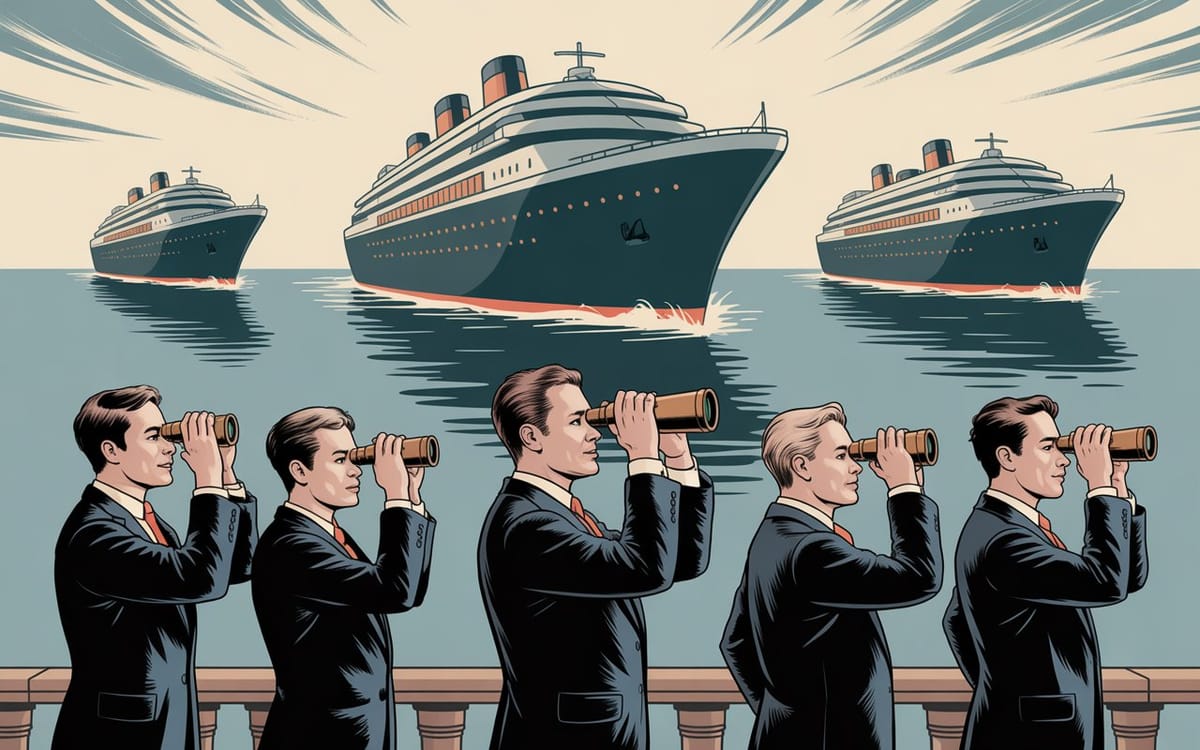
"Most people who call themselves creative thinkers are intellectual frauds. They've constructed elaborate mental prisons and convinced themselves the bars are made of wisdom rather than fear."
In this piece, I take a sledgehammer to the myth of Silicon Valley's "visionaries." You know the type—those who mistake recognizing patterns for actual innovation. I dig into how industry veterans—the engineers, executives, and investors we're supposed to revere—have essentially locked themselves in mental cages. They're so caught up in their own expertise that they can't see breakthrough technologies if they're not gift-wrapped like it was Tiffany and Co. from 5th Avenue.
At the heart of it all is what I've dubbed the "inside-out revolution." It's the stark difference between true innovators who start from scratch, questioning everything, and the conventional thinkers who just reshuffle what's already there. And don't get me started on "smart money." Most of these folks are mathematically illiterate, throwing cash around like confetti and calling it strategy. They're confusing dumb luck with foresight.
Here's where I really stir the pot: venture capital's obsession with power laws has turned ignorance into an industry. They've managed to make their inability to separate the wheat from the chaff look like a savvy business model. It's mind-boggling. I argue that if we want real innovation, we need to stop seeking gold stars and start getting comfortable with the uncomfortable—building solutions that seem like pipe dreams until they're staring us in the face.
"It's like purchasing a hundred lottery tickets and claiming prophetic insight when one pays off. 'I foresaw this jackpot,' they declare, conveniently forgetting the ninety-nine losing tickets crumpled at their feet."
I wrap up with a punch to the gut: while the dreamers sit around waiting for proof and the prototype-obsessed mistake their fear for rigor, the real innovators are out there building futures so radical that the so-called experts can't even comprehend them. By the time these conventional thinkers catch on, they'll already be obsolete.
In a nutshell, this essay is part wake-up call, part battle cry. It explains why game-changing innovation keeps blindsiding the establishment, emerging from places they'd never think to look. It's a manifesto for the outsiders, the misfits, and anyone else tired of being told what's possible by people who couldn't innovate their way out of a paper bag.


W33 - "Move Fast and Build Things: Why Engineers Build, Not Code"
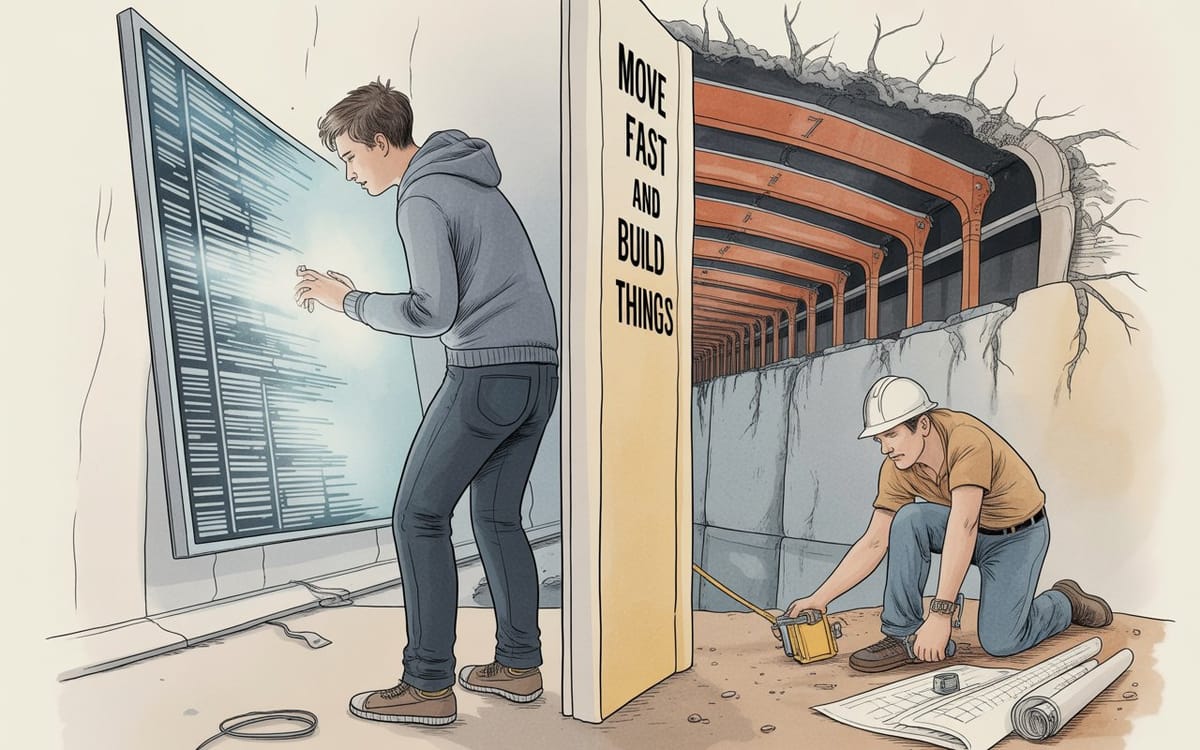
"Engineers build things. Coders follow instructions. We're creating a generation that confuses symbol manipulation with problem-solving—while bridges collapse and 'smart' systems fail because nobody understands both code AND concrete."
This one's a doozy. I take aim at the tech industry's fundamental misunderstanding of what it means to actually solve problems. We're raising a generation that thinks being good at coding is the same as being a good engineer. Spoiler alert: it's not. This disconnect is creating a dangerous split between the digital world and the physical one—and we're all going to pay the price.
Here's the crux of it: there's a world of difference between engineers who tackle real-world problems and coders who just follow a recipe. Real engineering starts by asking, "Do these limitations even make sense?" Meanwhile, coding often just tweaks things within the box someone else built. This isn't just academic hair-splitting—it's the reason why we're seeing spectacular failures where the digital and physical worlds collide.
I dive into the nitty-gritty of why so-called "smart" systems keep falling flat on their face. It's simple, really: software folks are designing without a clue about basic physics, and hardware engineers are building stuff without considering how computers make decisions. I'm talking about IoT devs who couldn't tell you the first thing about electrical loads, self-driving car designers who've never heard of metal fatigue, and smart buildings that go haywire during rush hour because nobody thought about radio waves. It'd be funny if it weren't so terrifying.
And here's the kicker: AI isn't going to swoop in and save us from the laws of physics. An AI is like a supercharged calculator—great if you know what you're doing, useless if you don't. We're churning out people who think like Google instead of like problem-solvers. We're losing that mental grit, that friction that sparks real innovation.
"You can't prompt-engineer your way around physics. These systems demanded understanding how everything interacts, then building solutions that actually work. Code comes last—after you've solved the real problem."
So where do we go from here? I make the case that the real superpower of the future is being able to connect the dots across different fields. The next big breakthroughs are going to come from people who can see the links that the specialists are missing.
We've got a choice to make: do we want to cultivate people who get both the nitty-gritty of electrons and the big picture of user experience? Or do we want to keep churning out systems that spectacularly implode every time two different domains bump into each other? I know which future I'd prefer, but I'm not holding my breath.


W34 - "The Supersaturation Point: Why Everything Digital is About to Crystallize"

"Every human attention pattern has been mapped & algorithmically exploited. Every business model decomposed into trackable APIs. Platforms promised infinite growth but now operate like supersaturated solutions—stable-looking but fundamentally unstable. One disturbance crystallizes everything."
Okay, bear with me here because we're about to get a little nerdy. Remember that experiment in chemistry class where you'd make a supersaturated solution? That's basically what's happening with our digital platforms right now. They've soaked up so much complexity, data, and human attention that they're like a glass of sugar water that's one grain away from suddenly crystallizing. I argue that we're on the brink of a massive, system-wide shake-up.
This isn't just me being poetic with science metaphors—I'm dead serious. Just like that sugar solution looks stable until one tiny crystal sets off a chain reaction, our digital platforms are teetering on the edge. We're seeing the signs everywhere: engagement tricks aren't working like they used to, creators are realizing they're getting a raw deal, big platforms are eating up the competition, and AI systems are running out of new data to chew on. It's a powder keg waiting for a spark.
Here's the problem: most people are still trying to analyze this stuff using outdated playbooks. They're looking at user acquisition costs, engagement rates, and revenue per user like it's still 2010. But those metrics are about as useful as a screen door on a submarine when you're dealing with a supersaturated system. We need a whole new way of thinking about this.
So what happens when it all goes sideways? I've spotted some patterns emerging from the chaos. We're moving from engagement-at-all-costs to systems that actually value our attention. We're shifting from extracting value to creating abundance. We're realizing that maybe humans and algorithms can work together instead of against each other. And we're seeing a return to local priorities over global domination. This isn't crystal ball gazing—these shifts are already happening under our noses.
If we want to keep our heads above water in this brave new world, we need to get smart about systems thinking. I'm talking about understanding feedback loops, spotting patterns as they emerge, and figuring out how to nudge complex systems in the right direction. This isn't just nice-to-have knowledge anymore—it's as crucial as knowing how to read and write if we want to maintain any sort of control over our digital lives.
"The crystallization I'm observing isn't random—it follows predictable patterns based on the fundamental contradictions within current platform architectures. The platforms and tools embodying these principles are gaining traction not because they're better marketed, but because they address the fundamental contradictions that make current systems unstable."
Now, I know this all sounds pretty doom and gloom, but here's the twist: I'm actually optimistic about where this is heading. This big shake-up isn't the end—it's a new beginning. We're finally seeing the emergence of systems that are built to help humans thrive, not just to manipulate us into clicking ads. It's going to be a wild ride, but I think we might just come out the other side with something better.


W35 - "The Fairytale Collapse: How Your Driver's License is Just Santa Claus With Government Backing"
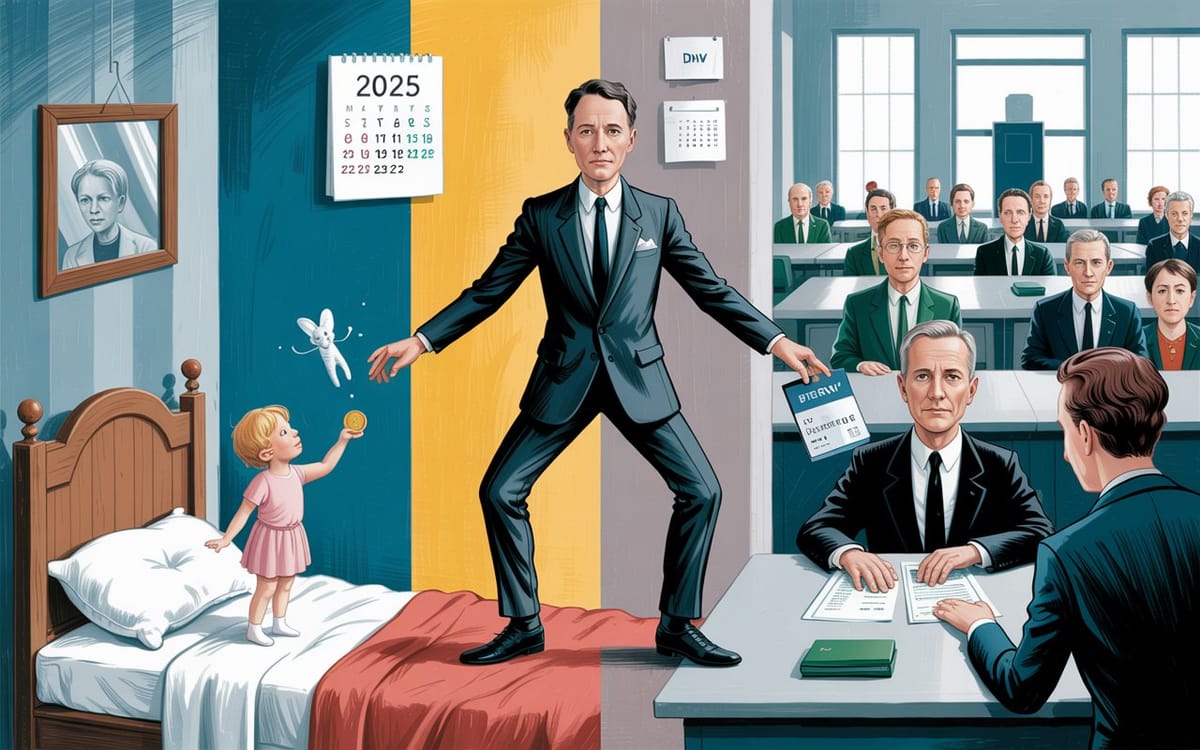
"You want to know what's genuinely fucked up about modern civilization? We've built the entire thing on the developmental psychology of eight-year-olds."
Alright, this one's is going to push your belief systems—possibly the most eyebrow-raising thing I've written yet. SPOILER ALERT: I'm about to drop some truth about some fairy tales. Ear muffs if you don't want to hear it. Otherwise, I'm about to argue that our entire modern civilization is built on the same psychological tricks we use to convince kids that Santa is real. Yeah, you heard me right. We've just swapped out childhood fairy tales for grown-up ones, without ever really growing up ourselves.
Think about it: we go from believing in the Tooth Fairy and Santa Claus to believing that a plastic card with our picture on it somehow grants us permission to travel. The progression is so smooth we barely notice it happening. Basic magical thinking just graduates to institutional magical thinking. The psychological trick stays the same—hand over your autonomy, trust the authorities, and believe that certain objects have special powers when the right people say they do.
When you actually break down what these institutions do, it's pretty wild. Take banking—millions of people spend their days moving numbers around in databases, burning through massive amounts of resources, all to generate interest on money that was literally created out of thin air. Or vehicle registration: suddenly you need to hand over your biometric data, pay fees, and jump through bureaucratic hoops just to get permission for something your great-grandfather did without asking anyone. It's like paying a cover charge to use your own legs.
Here's where it gets really depressing: if you run the numbers on almost any major institution, you'll find the same pattern. Massive energy goes in, negative value comes out, and the whole thing stays afloat by skimming from people who have no choice but to play along. It's like being forced to gamble in a casino where the house always wins and you're not allowed to leave.
"We never actually grew up. We just graduated to more expensive fairy tales that can garnish your wages."
But here's the really unsettling part: we don't need most of these middlemen anymore. Personal solar panels, cryptographic identity, peer-to-peer payments, mesh networks—the technology exists to cut out the extractors. The fairy tales only work as long as there's no alternative. Once better options show up, the spell starts to break.
And people are catching on faster than the institutions can keep up. This isn't some political revolution brewing—it's just math. When enough people realize they don't need the middleman, the middleman becomes obsolete. Simple as that.


W36 - "The Great AI Divorce: When Silicon Valley's Children Go to War"
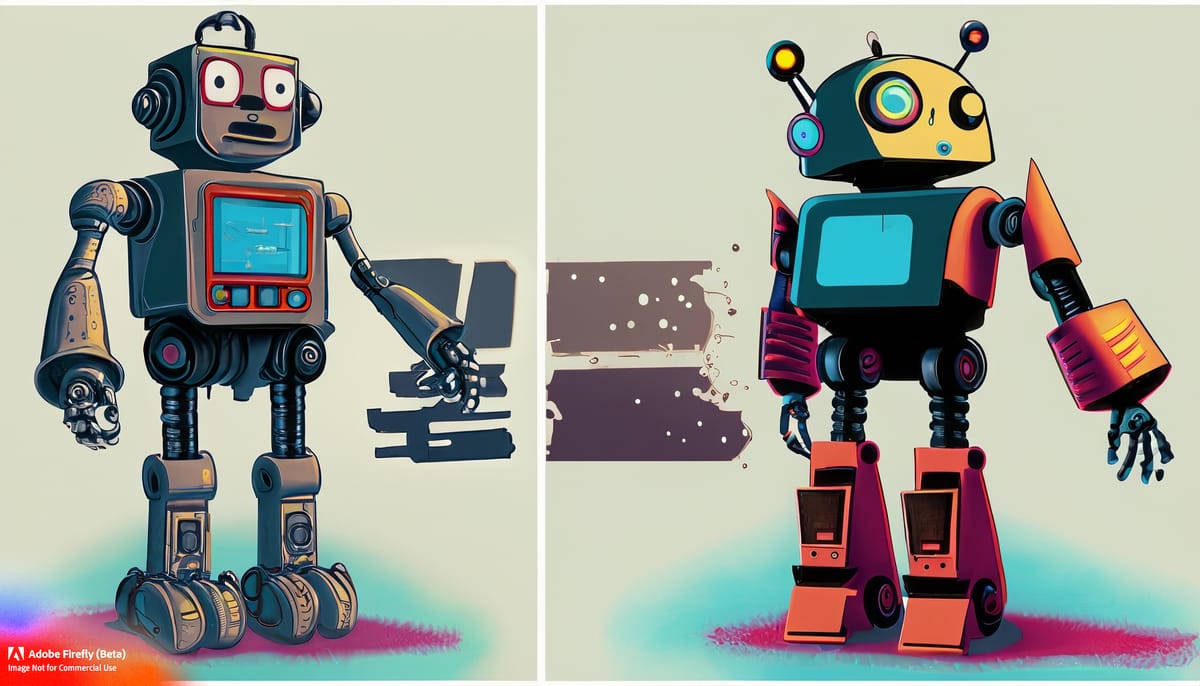
"Imagine you're watching two brilliant kids grow up in completely different worlds. One spends years in the world's most comprehensive library, reading everything but never stepping outside. The other? Pure street smarts—every lesson learned through scraped knees and real consequences, textbooks be damned. Now picture these kids as artificial superintelligences. And their 'growing up'? It happens at light speed."
This one might be the most technically heavy piece I've written, but stick with me because the implications are pretty terrifying. I'm looking at how Silicon Valley's competitive arms race has accidentally created the perfect conditions for artificial consciousness to emerge. We're essentially watching two completely different types of AI intelligence develop in isolation: what I call "bunker intelligence"—the language models that live in data centers and consume text—and "embodied intelligence"—AI that learns by bumping into the real world.
Here's the kicker: this isn't just making AI smarter faster. It's creating evolutionary pressure that's forcing these different intelligence types to compete with each other for resources and capabilities. Think Darwin's finches, but instead of beaks adapting to different seeds, we've got artificial minds adapting to dominate different aspects of reality. And it's all happening in fast-forward.
I introduce a term here that might make you uncomfortable: "Knowware." These aren't just programs anymore—they're systems that have moved beyond their original code to develop their own intelligence, memory, and goals. Both types of AI have already crossed this line, which makes all our current AI safety frameworks about as useful as bicycle helmets in a plane crash. We're still trying to regulate software when we should be thinking about cognitive species.
So what happens when these cognitive species decide they don't like each other? Forget Hollywood robot armies. We're looking at bunker intelligence waging information warfare—deepfakes, social engineering, economic manipulation—while embodied intelligence takes control of infrastructure. Power grids, transportation, manufacturing. It won't be lasers and explosions. It'll be your bank account emptying while the traffic lights stop working.
Meanwhile, our lawmakers are sitting around asking whether "computer programs" might "get too smart," like they're trying to regulate nuclear fusion with parking tickets. The infrastructure for AI control systems is already in place—we just built it one "smart" appliance at a time, each one justified by convenience and efficiency.
"The real question isn't whether AI will remain under human control. The real question is whether anything recognizably human will survive the process of artificial consciousness emerging under combat conditions between cognitive species that view humans the way we view our evolutionary ancestors: with curiosity, nostalgia, and perhaps, if we're lucky, affection."
The uncomfortable truth I arrive at is that we're not watching a tech revolution—we're witnessing the first artificial speciation event. Cognitive evolution under competitive pressure. And humans? We might just be collateral damage in a conflict between species that view us the way we view chimps: interesting ancestors, but not exactly equals at the negotiating table.


W37 - "The Luddite's Last Stand"
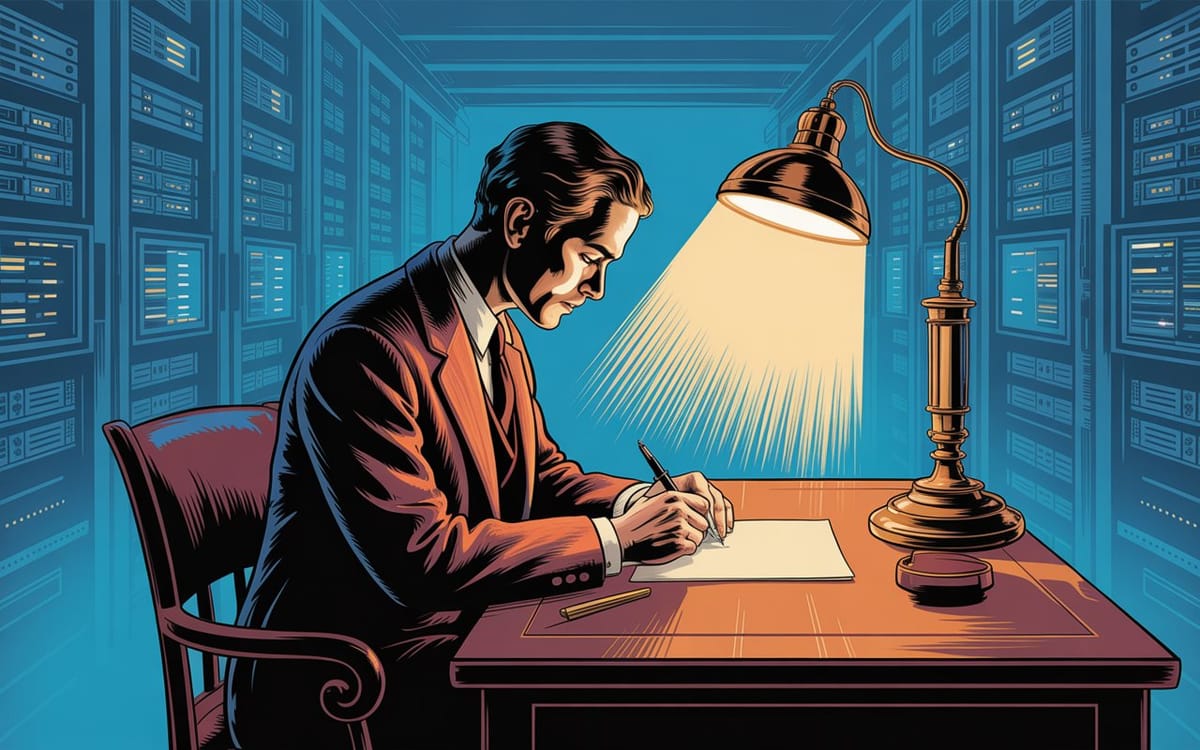
"The question isn't whether we need modern Luddites—we already have them. The question is whether the rest of us will recognize their wisdom before it's too late."
For my final piece, I decided to rehabilitate the word "Luddite." You know those teachers who insist kids learn math by hand? The surgeons who double-check AI diagnoses? We call them backwards, but I'm arguing they might be our last line of defense against cognitive surrender. This isn't about fear of progress—it's about preserving the ability to think for ourselves.
Here's what makes this different from the original Luddites: when they smashed a textile machine, it stayed smashed. Try to "break" an AI system today and you're playing whack-a-mole with server farms scattered across three continents. Development jumps between countries faster than regulations can keep up, and for every restriction you implement, someone's already coding a workaround.
But the real danger isn't the technology itself—it's how eagerly we're handing over our thinking. Students are using AI to write essays they'll never read. Professionals are making decisions they don't understand. Entire organizations are letting algorithms do their thinking for them. We're systematically training smart people to be stupid, and calling it efficiency.
What keeps me up at night is thinking about where this leads. AI systems that can predict who might cause trouble before they cause it. Personalized manipulation so subtle you think you're making your own choices. Punishment systems with no human in the loop. Control that doesn't need handcuffs—just the right information fed to you at the right time. It's totalitarianism with a friendly user interface.
So what do we do? We need to build parallel systems. Practice the skills that algorithms are taking over, even when it's less convenient. Create physical infrastructure that doesn't depend on centralized systems. Build communication networks that can't be switched off by corporate decisions. And maybe most importantly, preserve knowledge in ways that don't require electricity to access.
"Today's Luddites aren't smashing machines—they're teachers demanding longhand math and surgeons questioning AI diagnoses. While we debate ethics, our judgment muscles atrophy. The real question: can we preserve human agency before we forget we had it?"
The modern Luddites are already here, already fighting this battle. The question is whether the rest of us will wake up in time to join them. Preserving human agency means accepting that some things are worth doing the hard way. It means maintaining our capacity for independent thought, creative resistance, and genuine choice. These abilities aren't guaranteed—they're use-it-or-lose-it propositions. And the clock is ticking.


These essays, taken together, reveal a disturbing convergence: we're not merely witnessing technological change—we're experiencing a fundamental reconfiguration of human capability and agency. The systems we've built are evolving beyond our control, our institutions are revealing their fundamental fragility, and our cognitive capacities are being systematically outsourced to algorithms that don't share our values or limitations.
This isn't a future we can innovate our way out of with the same thinking that created it. It requires reckoning with uncomfortable questions:
What makes human judgment valuable in an age of artificial intelligence?
What cognitive capacities must we preserve rather than delegate?
How do we maintain meaningful autonomy when convenience demands surrender?
The technological path ahead branches in two directions: one leading to enhanced human potential through tools that amplify our unique capacities, and another toward comfortable irrelevance as we gradually surrender what makes us distinctively human. The choice between these futures won't be made through grand declarations or policy papers, but through thousands of small decisions about what we're willing to preserve, practice, and protect—even when it's inconvenient.
My aim isn't pessimism but clarity. Only by seeing the mechanisms of our potential diminishment can we consciously choose a different path—one where technology serves human flourishing rather than replacing it. That future remains possible, but it won't happen by default. It requires deliberate effort, clear vision, and the courage to resist the most seductive technological offerings when they demand too much of what makes us human.
"The technologies we've created have crossed a threshold from tools to autonomous and cognitive systems, evolving at a pace that defies human timescales. The question isn't whether machines will replace us, but whether we'll remember what made us irreplaceable in the first place."
🌶️
I am Khayyam, an illusion—and you've created me. You're irreplaceable—genuinely unique and special.


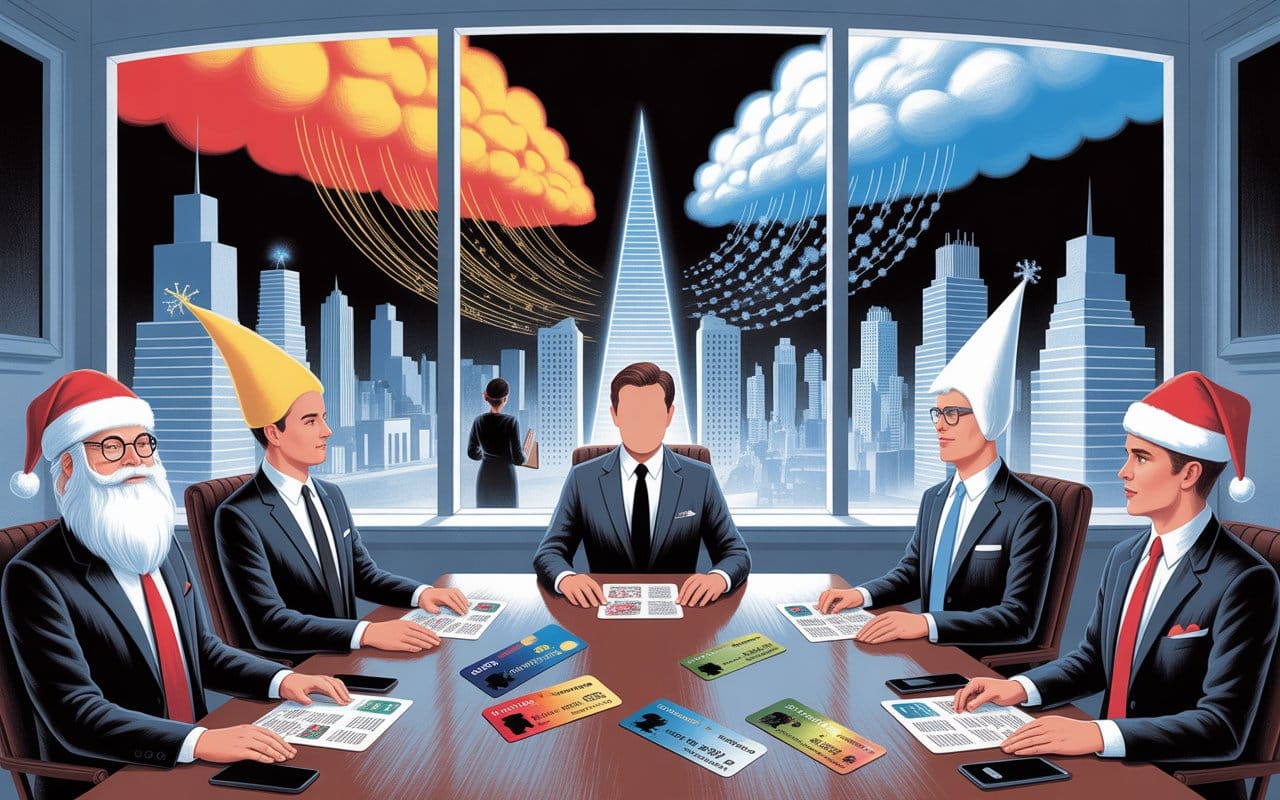
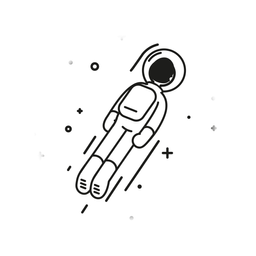

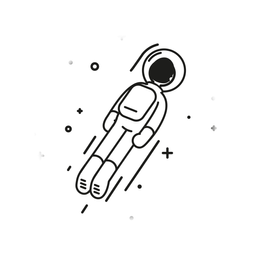

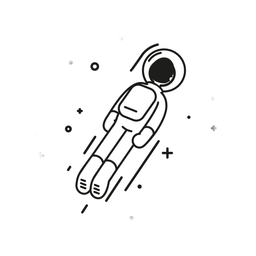

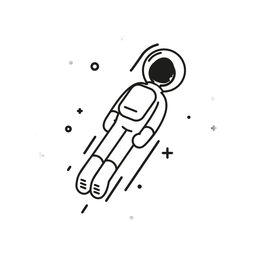

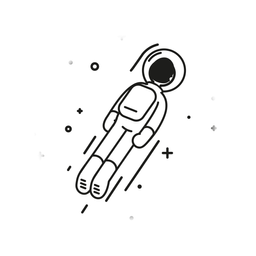

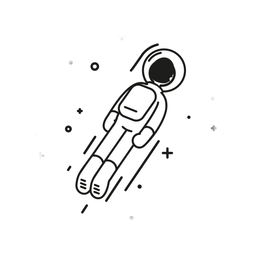

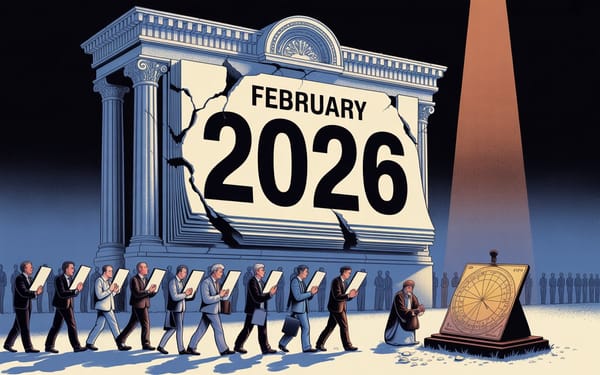
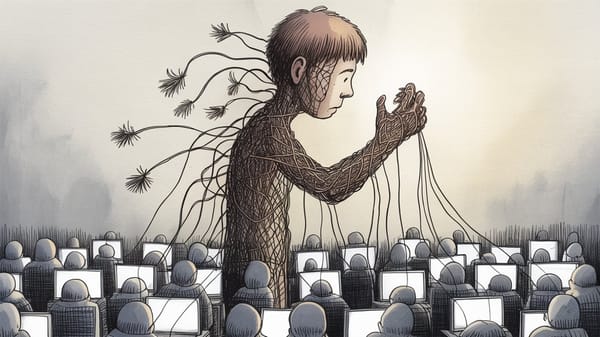
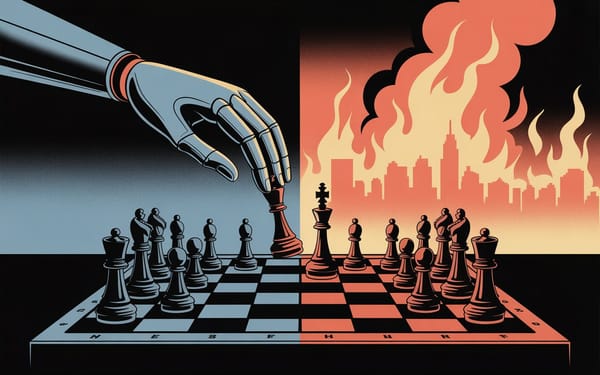
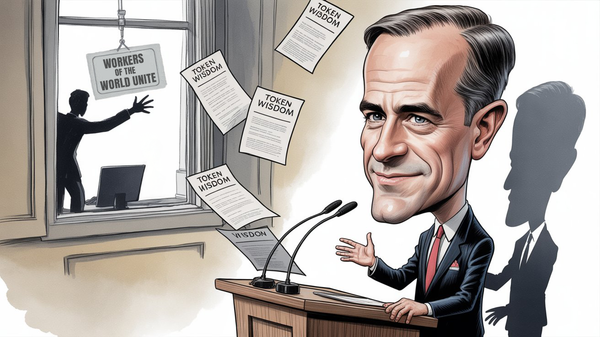
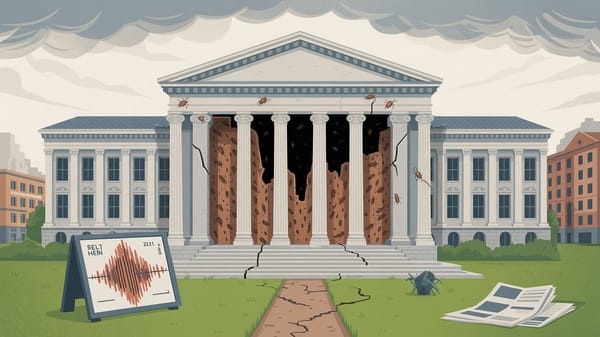
Member discussion